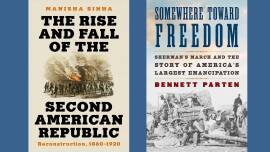In the wake of the Boston Tea Party, the British government in 1774 sought to rein in Massachusetts colonists with a series of harsh laws that closed Boston’s port and severely limited the right to representative government and due process of law. The fallout from these so-called Coercive Acts, including the attempted dissolution of the colony’s legislative branch, sparked intense debates within the community and became a critical factor on the road to the American Revolution.
Historians and current Massachusetts elected officials discuss and answer the audience questions on the meaning of the Coercive Acts today, with a particular focus on the role of the Massachusetts Legislature in our constitutional scheme of state government. The topics heatedly debated at the time—competing interpretations of representative government, the relative powers of the executive and legislative branches, the role of the individual and community in relation to government proper , and the consequences of resisting arbitrary power—still resonate strongly today.










